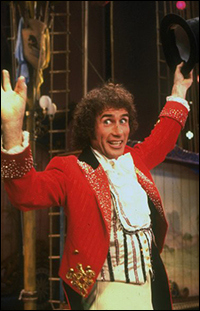
Even the title masks a multitude of talents. Jim Dale is the guy who serenaded Lynn Redgrave to stardom with Oscar-nominated lyrics ("Hey there, Georgy girl/Swingin' down the street so fancy-free..."). He ring-mastered and tightrope-walked his way to a Tony in Barnum. He gave Grammy-winning voice to the Harry Potter books. He was the first client of Sir George Martin, who'd soon produce The Beatles, and a charter-member of the British Carry On team that scampered across movie screens in the '60s. At the invitation of Laurence Olivier, he joined London's National Theatre and shared the stage with Anthony Hopkins (The Architect and the Emperor of Assyria) and Paul Scofield (The Captain of Köpenick). In his spare time, he was a teen pop star, a Shakespearean actor and a stand-up comedian.
With the help of director Richard Maltby, Jr., (an old hand at high-speed cavalcades like Ain't Misbehavin'), he skips and sprints over his career highlights. Not without casualties, of course: The Carry On nostalgia got carried off screaming for U.S. consumption but will be reinstated for the English edition—in spades. "Those films were as popular in England as 'M*A*S*H' [was] over here. They are shown three or four times a week; at Christmas, it's a whole evening of Carry On films on two or three channels. Not only have they seen you, they have seen you 50 times!"
Just Jim Dale started out as "just something for the grandkids in England. If they couldn't see me on Broadway or doing the big roles, they could watch me on a DVD in later years, perhaps show it to their great-grandchildren as well and get them to laugh at the same jokes we laughed at. In the show, there are jokes that were making people laugh 150 years ago. The delivery may have changed, perhaps the story in the joke's may be brought up to date, but some of them go back to the 17th century."
 |
||
| Dale in Barnum. |
||
| photo by Martha Swope |
The role that best incorporates his Music Hall training is his personal favorite: Scapino, which he created with Frank Dunlop out of Molière by way of the Marx Brothers. It brought him to Broadway and the first of his five Tony nominations. "Breaking down that fourth wall and talking directly to the audience goes all the way back to Shakespeare and, of course, it was definitely Music Hall. It was variety. It wasn't a play. It wasn't vaudeville where they did sketches, ignoring the audience. No, Music Hall was facing that audience and talking and communicating with them. Every step that I have taken in my career was as a result of something from Music Hall. I learned timing from Music Hall. I learned from watching comics from the old Music Hall of 70 years ago. I put together many characters based on those guys."
And, as one with Music Hall roots, he believes in passing the torch on to the next generation. "That eccentric dancing that I did in The Threepenny Opera — Bebe Neuwirth came backstage and said, 'Don't you dare die until we put all those dance steps on tape so that the rest of us can learn them.' I was nine to 12 years old when I learned them. My teacher was an old guy who learned them from his grandfather, who learned them from his grandfather. Those steps were danced by buskers in the streets of London in the early 1800s, so, when Bebe says, 'capture them on video,' she really means it because they're dying out. Nobody else is doing them anymore."










